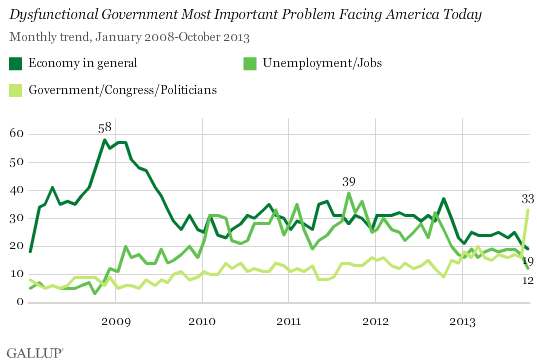This article is part of an ongoing series analyzing how the government shutdown and the debate over raising the debt ceiling are affecting Americans' views of government, government leaders, political parties, the economy, and the country in general.
PRINCETON, NJ -- Americans are now more likely to name dysfunctional government as the most important problem facing the country than to name any other specific problem. Thirty-three percent of Americans cite dissatisfaction with government and elected representatives as the nation's top issue, the highest such percentage in Gallup's trend dating back to 1939. Dysfunctional government now eclipses the economy (19%), unemployment (12%), the deficit (12%), and healthcare (12%) as the nation's top problem.

Americans' mentions of either the economy in general or jobs in particular as the nation's top problem had already been declining in 2013. Both issues dropped further as top-of-mind concerns in the Oct. 3-6 survey, conducted in the midst of the U.S. government shutdown.
At the same time, the percentage of Americans who mention some aspect of government leadership as the nation's top problem has doubled, 33% this month from 16% last month. This almost certainly reflects the current upheaval in Washington and party leaders' inability to agree on a way to fund the government or avoid a possible government default. October is the first time since 2008 when an economic issue was not at the top of Americans' list of most important problems.
Democrats (36%) and independents (33%) are somewhat more likely than Republicans (23%) to mention dysfunctional government as the most important problem facing the country, perhaps reflecting partisans' differing views about the role and importance of government.
Syria, which captured 8% of mentions last month, has faded in importance in Americans' minds, dropping back down to 1%. The percentage of Americans mentioning the federal budget and deficit as the top problem has increased from 5% in September to 12% now.
Implications
The percentage of Americans who view dysfunction in Washington as the most important problem facing the country is now at a record-high level. Thus, Washington leaders' continuing focus on posturing and sticking rigidly to principle while waiting for the other side to "give in" is obviously wearing thin with the American public, particularly given that a partial shutdown of the government has ensued.
During the last protracted government shutdown in January 1996, Americans also increasingly said that dysfunctional government was the nation's top problem, but that percentage rose only to 17%, roughly half the level seen today. Back then, Americans were more likely to mention the budget and deficit (28%) than dysfunctional government as the bigger problem. This suggests that Americans this time are focusing more on problems with the process involved in governing rather than on the underlying issues involved.
These latest results are still one more example of the overwhelming lack of faith the U.S. public has in their government. Congress approval is now within one percentage point of being the lowest in history, trust and confidence in government was at record lows before the shutdown occurred, and the upheaval in Washington is causing Americans' confidence in the economy to drop precipitously.
Survey Methods
Results for this Gallup poll are based on telephone interviews conducted Oct. 3-6, 2013, with a random sample of 1,028 adults, aged 18 and older, living in all 50 U.S. states and the District of Columbia.
For results based on the total sample of national adults, one can say with 95% confidence that the margin of sampling error is ±4 percentage points.
Interviews are conducted with respondents on landline telephones and cellular phones, with interviews conducted in Spanish for respondents who are primarily Spanish-speaking. Each sample of national adults includes a minimum quota of 50% cellphone respondents and 50% landline respondents, with additional minimum quotas by region. Landline and cell telephone numbers are selected using random-digit-dial methods. Landline respondents are chosen at random within each household on the basis of which member had the most recent birthday.
Samples are weighted to correct for unequal selection probability, nonresponse, and double coverage of landline and cell users in the two sampling frames. They are also weighted to match the national demographics of gender, age, race, Hispanic ethnicity, education, region, population density, and phone status (cellphone only/landline only/both, and cellphone mostly). Demographic weighting targets are based on the March 2012 Current Population Survey figures for the aged 18 and older U.S. population. Phone status targets are based on the July-December 2011 National Health Interview Survey. Population density targets are based on the 2010 census. All reported margins of sampling error include the computed design effects for weighting.
In addition to sampling error, question wording and practical difficulties in conducting surveys can introduce error or bias into the findings of public opinion polls.
View methodology, full question results, and trend data.
For more details on Gallup's polling methodology, visit www.gallup.com.
